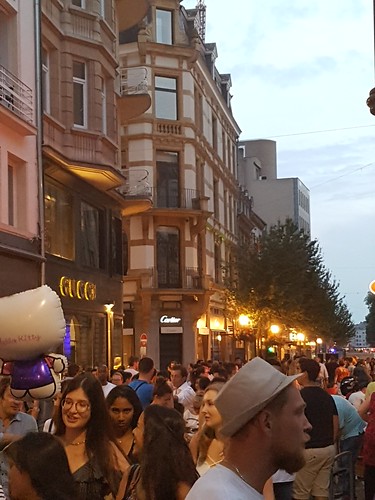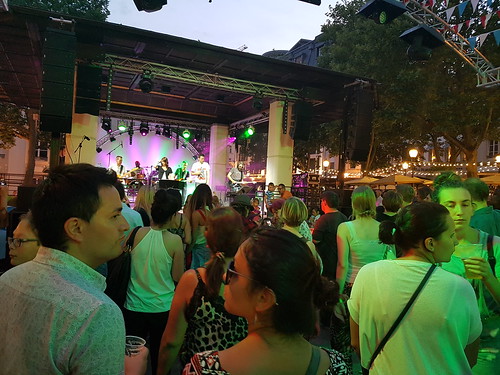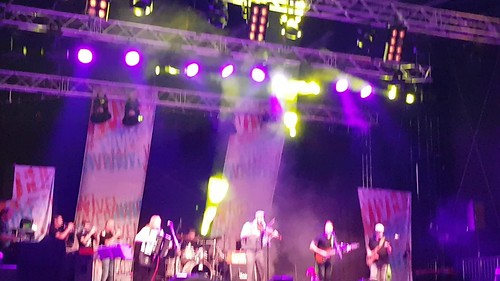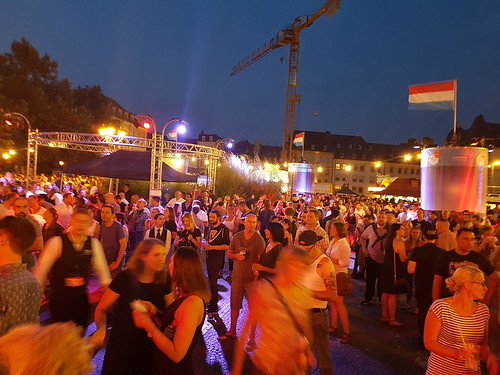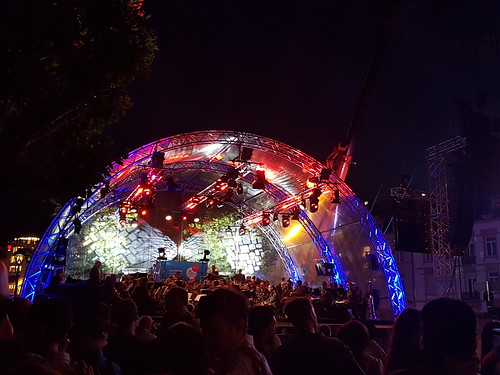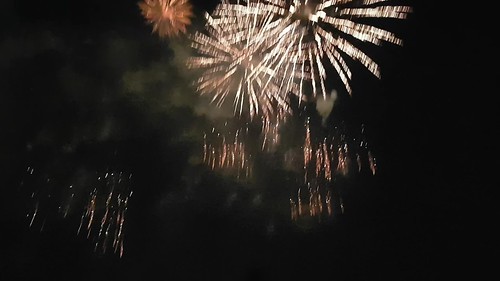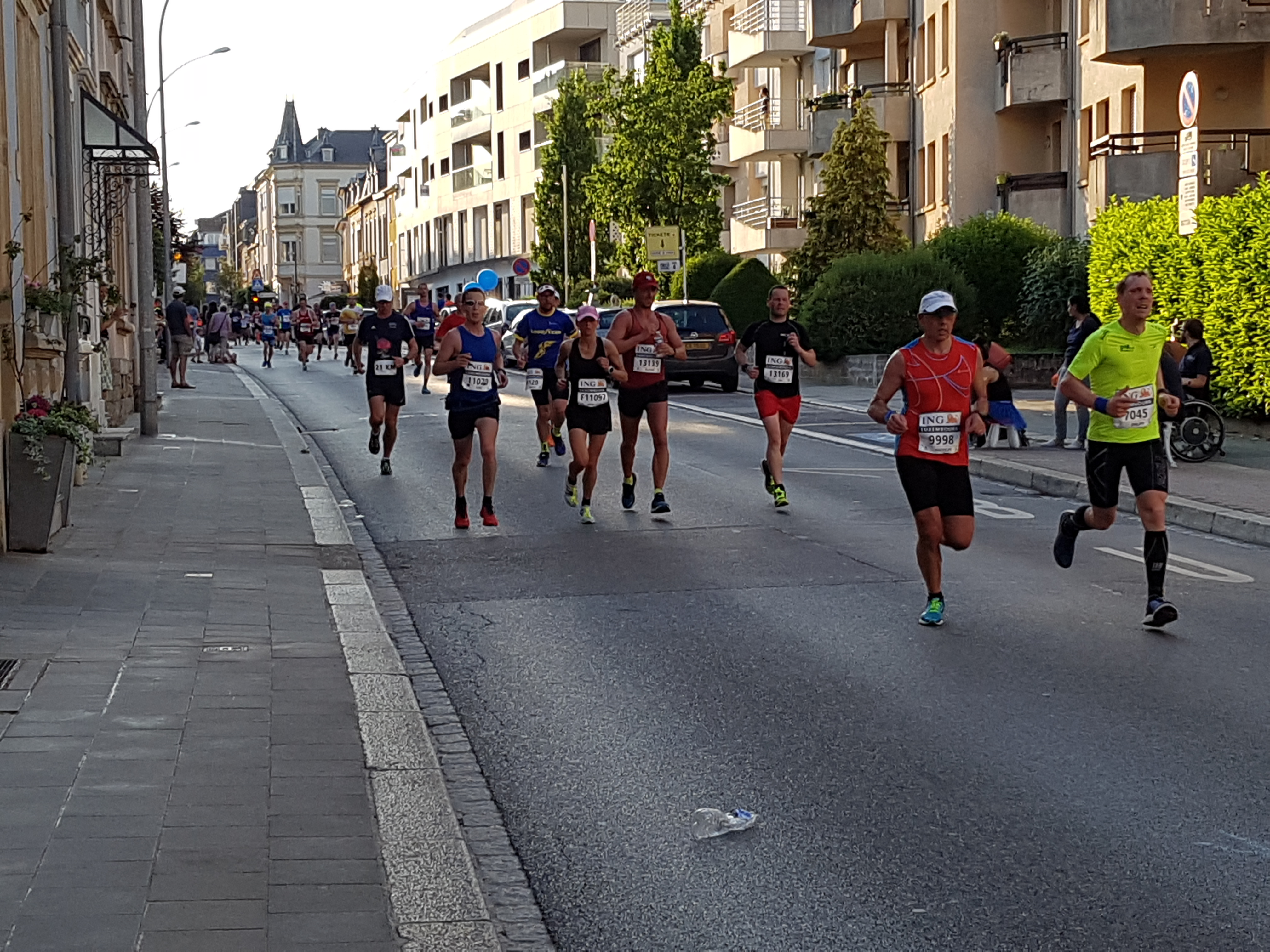Ellen OLeary was only 17 when she got married to a man 14 years older than her. She bore him 11 children and according to the 1911 census, 9 of them were still surviving at the time of that census. Only 7 of them are listed as living in her household in the 1911 census.
We know this because in both 1901, and 1911, she and her husband Thomas were living in House 4 in Kiltoohig, Charleville, Co Cork. In 1911, the census took information relating to length of marriage and number of children and number of surviving children born in the family.
The townland of Kiltoohig was then, and still is now to a great extent, primarily farmland. In both 1901 and 1911, there were just five houses located within it. You can see these on the OSI Historic 25 Inch Map.
Four of them also appear on the Cassini 6 Inch which I think dates from around the 1830s or so. Of the houses on the map above, I am fairly certain that at least 3 are still in place. It is difficult to get a decent zoom of the entire townland on a wide screen because the top right hand corner of the townland sticks out like a leg. A regular shaped townland it is not.
According to the logainm website, Kiltoohig is derived from An Choill Tuaidh which translates to the North Wood. I found this surprising as I always understood it to come from Cill Thuathaigh which translates as Chapel in the Country. Kiltoohig crops up in the Schools Collection as well. The Schools Collection was a collection of folklore and local knowledge carried out by school teachers in the 1930s to try and retain local knowledge, myths, superstitions and the like before the older generation died out. In Shandrum, Nancy Saluin collected knowledge relating to Kiltoohig – she uses one of the variant spellings – Kiltwohig – and it seems to support the story of the chapel rather than the story of the wood.
There is an old ancient graveyard where people were buried about 100 years ago in John Houghran farm of Killtwohig and headstones can be seen there today.
There was a church in Cill tú igh on Hourigan’s farm about 150 years ago. Remains are levelled – Nancy Saluin
Seán Clápeire and Andrias Mac Craith held a [unclear[ Filíochta [again unclear] in Kiltoohig twice a year – Nancy Saluin, Shandrum

To be honest, the writing isn’t very clear to me and I suspect that the first poet listed above should be Seán Clárach Mac Domhaill who wrote Mo Ghile Mear, or the other possibility is Seán Ó Tuama. But we do know that Seán Clárach Mac Domhnaill lived and taught in Kiltoohig and is basically the biggest star to come out of the place.
Those poetry gatherings took place around the 1700s, however, and 200 years before the people we are interested in turned up in Kiltoohig.
Three of the houses remained within the same families between 1901 and 1911, the aforementioned Leary family who were in House Number 4, the Finn family in House Number 2 and the McCarthy family. However, the McCarthy family were listed as being in House 5 in 1901 and House 3 in 1911. At this point in time, I am unable to map the houses as listed in the census to the houses which appear on the 25 inch historic map.
House number 1 changed occupants between 1901 and 1911. Unlike Houses 2-5, it was not a farmer family occupied house in 1901 and it contained 2 households. According to the map above, one of the houses was closer to the town of Charleville than the others so I suspect if a house was spit into two dwelling places, it may most likely be that one.
But I am not sure. What is interesting, however, are the occupants. One flat consisted of a farm labourer aged 50, living on his own. Farm labourers feature across the houses in Kiltoohig as do domestic servants. Because of the way census are drawn up, we cannot be certain that the farm labourers lived with their masters although many are listed as being present with their masters on the night of the census. In Kiltoohig, William Daly is an exception. He is in his own dwelling on the night of the census.
The other family consists of Mrs Mary Cahill and her son Denis. Denis is 30 and unmarried. His mother is listed as 70 which suggests she was 40 when he was born, which, even by modern standards, is quite late. If there are other children, they do not live in this household. Mrs Cahill is a widow. She lives off an annuity and her son lives off interest money. In many respects, this is interesting. They have enough to pay a flat and not work, but they are in what is, at that point a two family house. Mary Cahill is listed in a document relating to the return of advances under the Purchase of Land(Ireland) Act, 1891, Section 33, in 1902-03. This seems to imply that she had acquired land from the Earl of Shannon and had received an advance to do so sometime around 1891.
By the time 1911 rolls around, House 1, if it is still the same house, is no longer a two family house, or if it is, only one of the units within it is occupied. Both the Cahills and William Daly are gone. It is possible that William Daly has moved to work for a farmer elsewhere in Cork – there is one candidate in the 1911 census that fits – but it cannot be deemed to be certain. As for the Cahills, a Denis Cahill in the right age bracket turns up married around 1908 in another part of Cork, a publican farmer. Maybe it was him; maybe it was not.
In 1911, the house was occupied by Edmond Hunter and his wife Jane. Edmond lists his occupation as dairy farmer – a little more detail than other farmers give. He and Jane married quite late in life, in around 1908. They are aged 50 and 45 when we meet them. It seems to me to be quite fascinating that they are late married. It is worth noting that the land around Kiltoohig, and the townlands around it, are still mainly used for dairy farming.
In the 1901 census, there is only one possible candidate for Mr Hunter and his name is spelled Edmund rather than Edmond. In 1901, Edmund Hunter is the 3rd of six adult children ranging in age between 30 and 45, all living with their mother Julia in Annikisha, a townland between Mallow and Mitchelstown.
House Number 2 was occupied by the Finn family. The head of the household was Catherine, and in 1901, she was 70, and a widow. Two sons were living in the household, neither listed as married, aged 39 and 35, Martin and Michael. They only spoke English. Also in the house on the occasion was a Maurice Finn, listed as a farm servant, and, unlike the others in the household, listed as illiterate, but, however, spoke both Irish and English. It is possible that he was a relative, but I cannot be sure of this. He is 55 years old at this point.
By the time 1911 rolls around the Finn family are still living in House Number 2. Catherine Finn is still the head of the household although her age is given as 82 which suggests there were counting problems either in 1901 or 1911, and Martin and Michael are listed as 42 and 38 which makes the grand total of no sense at all given they were listed as 39 and 35 10 years earlier. Per the census, they were all able to read and write so illiteracy cannot be seen as a reason for the age discrepancy.
House Number 3, in 1901 is lived in by three siblings bearing the surname Flaherty. The head of the household is Edmond, and he appears to have been the middle child, aged 45, and in between his two sisters Jane (48) and Anne (43). Both the women have profession listed as “farmer’s daughter”.
In the company of the family on the night the census was taken was a 46 year old farm servant called John O’Brien. No one in the house is married, and all of them are literate and monolingual English speakers.
In 1911, House Number 3 is listed as being occupied by the McCarthy family, listed below under House number 5. The records are unclear on whether the McCarthy family moved house or the house numbers are inconsistent. Assuming the houses went with farms of land, I’m going to assume that it is the house numbers are inconsistent and describe the family listed as being in house number 5 in 1911. They are new arrivals.
The O’Connell family is headed up by Maurice O’Connell a 65 year old widower. According to his census record, his family had 8 children and 7 of those survived. Four of them are living with him in the house in 1911, namely Ellen, Norah, Michael and Patrick.
I think this family came from Limerick, from a house in Meadagh, Uregare, Limerick which according to the map is between Bruff and Banogue, about 8-10 miles from the house in Kiltoohig. (there’s a really impressively looking castle ruin there too – Ballygrennan).
There is a 1901 census record which matches several of the family names, although Maurice’s age does not line up by about 5 years. However, we already know that age was a bit of a movable value in some of the households for this area and this age group so I think it may be safe to assume they are the same family. In 1901, in Meadagh, Maurice’s wife is listed and she is apparently 2 years older than him. Her name is Eliza. 6 children are living with the family in 1901, along with a boarder and a servant. The boarder shares an unusual name with one of the children, namely Hanoria (Norah in the later census) which leads me to suspect that with an age of 75, she may have been Eliza’s mother.
It is unclear what caused the household change in this house; which house became free first and why the families might have moved between 1901 and 1911. We know that two of the children appear to have left the family home in that time, and in any case, even in 1901, 2 of the children are not listed. The 1911 census states 8 children were alive but we have a record of 6 in 1901 before the family came to Kiltoohig and 4 in 1911 when they were in Kiltoohig.
In addition to the family, in 1911, there was a servant by the name of Michael Dinan in the household. He was given as aged 30.
House Number 4 is Ellen Leary and her family. The head of the household is her husband Thomas, and ten children are listed. Children between the age of 4 and 13 are listed as scholars, and the children aged 15, 17 and 19 are listed as farmer’s children. From this we can probably infer that at some stage between the age of 13 and 15 at least, the children ceased to go to school.
House number 5 is occupied by the McCarthy family. and similar to the Flaherty household, it consists mainly of siblings. On the night of the census, 8 people are resident; 6 siblings, a niece, and a servant. Aside from Josie Kelly, the niece who is 9 years old, and Maggie O’Sullivan, the domestic servant, the family present consists of 5 males, namely Daniel (38), Charles (36), David (37), Thomas (34), James (35) and Catherine (39). All, with the exception of James, can read and write and are listed as English speakers. Daniel is the head of the household. It is interesting to note that in the McCarthy and Flaherty households, head of the household was not the oldest child of the family, but the oldest male child of the family. No one in the McCarthy household was married, and James was listed as deaf and illiterate.
According to the 1911 Census, the McCarthy family were living in House number 3, and again, 3 brothers and a sister are listed, in addition, a niece, and a domestic servant. Three of the family have moved out, or are not present on the night of the 1911 census, namely Catherine, David and Thomas. In addition to the occupants in 1901, Mary Kelly is present and she is the mother of the young child, Josie. Mary Kelly has been married for 20 years, is 43 years old and has had one child, who has survived. Daniel is still the head of the household, and apparently he is 50, James and Charlie are still living with him, aged 47 and 45. There are two servants in the house, an 18 year old girl named Katie McMahon and a 32 year old man called Denis Murphy. In 1911 apparently all members of the house hold can read and write. This is interesting because in 1901, Charles was listed as being unable to read and write.
Mary Kelly crops up in another document after 1911 however. She made a claim in respect of damages during the Civil War of the early 1920s.
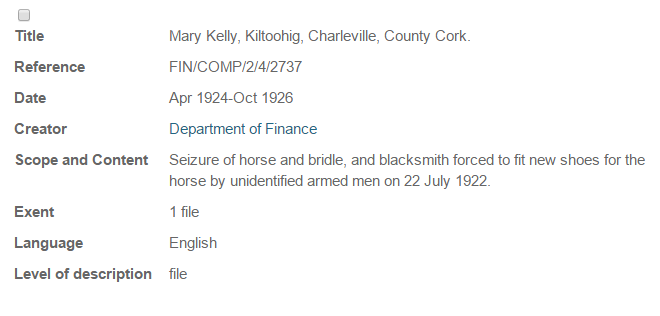
(National Archives of Ireland – run search on Kiltoohig)
Other references to Kiltoohig after 1911 reveal that a Mr Jonathan Naylor died in Kiltoohig on 13 July 1935. We do not know what age he was then, but we do know he outlived his wife, Charlotte Louisa who died in 1912 while they were living in Kilfinane. This information comes from the family headstone which can be seen here. The grave stone, and name implies that they were Church of Ireland and this is confirmed by their census record which can be seen here.
According to the 1911 census, Mrs Naylor bore 7 children, all of whom survived. At the time of the 1911 census, the oldest child still living in the household was 15 years old and attending school. Only one child is listed on the family headstone and she is not listed in the 1911, or does not have an obvious name variant. The other 6 are not listed. There is some evidence to suggest they were living in a different house in Kilfinnane in 1901 and more children are listed there, the eldest of which is 8. In 1901, Charlotte Louisa was 35 years old. She die in 1912 which suggests she was around 46 when she died. That’s quite young.
We have some information regarding landholders for 1921 from Guy’s Almanac. Amongst the principal landholders then were
Martin Finn (whom we know to be house number 2)
Mrs Hunter – probably Jane Hunter, House number 1. This suggests Edmond had died by now as he had been listed as the head of the household in 1911)
Thomas Leary – house number 4
In 1925, we have the same listed.
In 1930, we have
Martin Finn
Mrs Fitzgerald
Thomas Leary
This may imply that Mrs Hunter remarried. Or that she sold up.
The 1940 issue of Guys does not give us the same information and it is not obvious whether the families have moved and changed again by then. However, we do have a gravestone for Martin Finn dating from 1932, having died at the age of 58. He appears to have married at some point between 1911 and 1932; his wife is also listed on the gravestone and it suggests she was a dozen years younger than him.
Historically, we have some records for the area going back to the 1870s. In 1876 according to Guys Cork Almanac, for example, we know that principle landholders in Kiltoohig included Denis Leary and Margaret Leary – listed separately, also John McCarthy, Potentially they are parental to the families listed above.
Kiltoohig is listed in the list of Monuments in County Cork as being the location of an enclosure and a moated site. A one story vernacular house is also listed and it seems reasonable to suggest that this is one of the houses listed above.
There are quite a few Almanacs for Cork lying around so there is some scope for more research into society in Kiltoohig from around the 1700s onwards (when we know that Sean Clarach was knocking around) but more specifically, into the social history of the town of Charleville.
References and Research Material
Cassini 6 Inch – 1830s
OSI Historic 25 Inch
Kiltoohig in the Schools Survey
1875 Guys Almanac
1893 Post Directory
1897 Post Directory
1901 Purchase of Land Act (Ireland) advance repaid by or to Mary Cahill (House no 1, 1901) – land belonged to the Earl of Shannon
1925 Post Directory
Motor Directory 1911
Griffiths Valuation
Logainm
Statistical Survey of Co Cork








